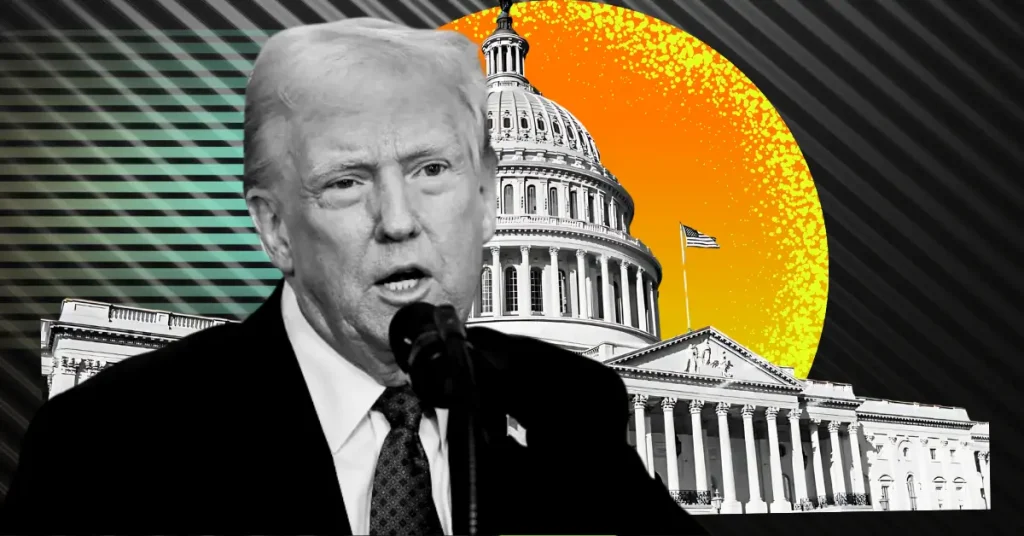Trump’s Crypto Crackdown: Could This Law Strangle Decentralized Stablecoins?
The crypto world braces for impact as Trump’s latest legislation takes aim at the backbone of DeFi—stablecoins.
The Regulatory Guillotine Drops
No more playing nice. The new rules could force decentralized stablecoins into compliance—or oblivion. Think 'Know Your Customer' protocols but for code.
Why This Hurts More Than Just Stablecoins
Kill decentralized stablecoins, and you kneecap DeFi’s liquidity. No more seamless swaps, no more yield farming—just TradFi with extra steps (and probably higher fees).
The Irony Isn’t Lost on Anyone
A law touted as 'protecting investors' might just hand the keys back to banks—the same institutions that still can’t agree on what a blockchain is.
Wake-up call: When regulators move in, innovation moves out. Unless, of course, you’re a Wall Street bank—then it’s just 'disruption.'

The U.S. political landscape just turned— and it’s already making waves in the stablecoin market.
Following Donald Trump’s win over Kamala Harris in the presidential race, the new administration wasted no time pushing forward its crypto-friendly agenda. As promised, TRUMP has launched multiple pro-crypto policies, including the creation of a special SEC task force focused on building a clear regulatory framework for cryptocurrencies.
Now, the spotlight is on the GENIUS Act — a landmark stablecoin bill that could redefine the future of digital finance in America.
What Is the GENIUS Act?
Stablecoins are digital assets pegged to fiat currencies like the U.S. dollar. With a current market cap of over $261 billion, stablecoins like Tether (USDT), USDC, and USDS dominate this segment.
The GENIUS Act is a new law passed to regulate this fast-growing space. While it may appear to be just another compliance step, crypto experts like Quinten believe its impact could be far greater — potentially reshaping who wins and who loses in the crypto economy.
Key Features of the GENIUS Act
The Act introducesfor stablecoin issuers. Here’s what it changes:
- Licensing Required: All issuers must be licensed by state or federal authorities.
- Backed by Safe Assets: Stablecoins must be backed 1:1 by cash or U.S. Treasuries.
- Monthly Reserve Reports: Issuers must publish detailed monthly reserve data.
- AML and KYC Compliance: Full adherence to anti-money laundering and know-your-customer regulations.
- No Political Affiliations: Issuers must not be tied to political organizations.
However, critics have already raised eyebrows about the involvement of World Liberty Finance, which reportedly has links to Trump’s family.
How It Could Boost U.S. Stablecoin Dominance
According to Quinten, the GENIUS Act brings much-needed legal clarity, especially for banks and corporations looking to issue their own digital dollars.
His viral post on X claims the act will lead to a surge in stablecoin adoption by major institutions.
![]() THE GENIUS ACT JUST PASSED
THE GENIUS ACT JUST PASSED![]()
The U.S. is finally regulating stablecoins and it’s bigger than you think
Here’s why this bill could reshape crypto, supercharge $USDC and $USDT, and unlock the next wave of adoption![]() pic.twitter.com/Q45IPJM9Vj
pic.twitter.com/Q45IPJM9Vj
Insider buzz suggests that giants like Amazon, Apple, Walmart, and JP Morgan are already preparing to enter the stablecoin space.
Bad News for Decentralised Stablecoins?
While the act supports institutional stablecoins, it could crush decentralised projects.
Here’s why:
- Unlicensed issuers are banned from operating in the U.S.
- The government can freeze stablecoin assets at will.
- Non-compliance leads to 5-year prison terms or $1 million/day in fines.
Quinten warns that this crackdown could push decentralized and foreign stablecoins out of the U.S. market entirely.
Final Thoughts: Is the GENIUS Act the Beginning of a New Era?
The GENIUS Act marks a clear pivot in U.S. crypto policy — one that favors regulation, institutional adoption, and dollar-backed digital assets.While it opens new doors for corporate stablecoins, it also risks sidelining decentralized innovation. With Trump’s pro-crypto task force gaining momentum, the U.S. might soon lead the world in regulated digital asset development — but at what cost?

